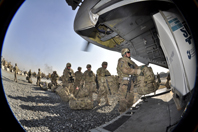Office of Research & Development |
 |

VA Research Currents archive
September 10, 2015

U.S. soldiers from the Guam Army National Guard prepare to board a CH-47 Chinook from Camp Phoenix in Kabul, Afghanistan, in 2013, before heading home. A new public-private study is looking at the factors that help troops reintegrate after deployment. (Photo by Sgt. Eddie Siguenza)
VA is among several public and private partners working with the Henry M. Jackson Foundation for the Advancement of Military Medicine on a new study aimed at learning what types of programs and services are most helpful to Veterans as they reintegrate after deployment.
The Veterans Metrics Initiative, or TVMI, will enroll 7,500 service members separating from the Army, Navy, Marine Corps, Air Force, and Reserve and National Guard units. Researchers will survey them within 90 days prior to their leaving military service and reassess them every six months for three years.
The study has three goals:
"We asked a group of scientific experts to help answer the question of how to measure what works to improve Veterans' long-term well-being outcomes," says Cynthia Gilman, a vice president at HJF and administrative lead on the study. "The DoD, VA, and civilian researchers accepted the challenge and worked collaboratively for more than two years—without compensation or funding promises—to design the TVMI study."
The effort will complement ongoing VA and Defense research such as the Millennium Cohort Study (MCS), says Dr. Laurel Copeland, one of TVMI's scientific leaders. The MCS, while comprehensive in some ways, collects follow-up data on Veterans only every three years.
"The Veterans Metrics Initiative will fill in the fine detail on the canvas on which the Millennium Cohort Study has painted the broad strokes," notes Copeland, associate director of the Center for Applied Health Research, based at the South Texas Veterans Health Care System.
Her South Texas VA colleague Dr. Erin Finley, another study leader, adds that TVMI expands the focus beyond the issues looked at in most previous research on reintegration.
"We know that simply looking at Veterans' health doesn't tell us everything we need to know about all the different aspects of a Veteran's life that affects his or her happiness and well-being," says Finley. "This is the first study of its kind to provide such a rich and nuanced look at the experience of transitioning out of the military for this generation of Veterans."
As part of the study, researchers are designing and testing new surveys and other means to gauge Veterans' well-being. The tools are likely to find wide use beyond TMVI itself.
"The measures being created and validated for this project reflect great leaps forward in our understanding of Veterans' needs and services over the past decade," says Finley. "The resulting measures are likely to have relevance for a wide array of future research projects."
VA investigator Dr. Dawne Vogt, who is also helping lead the study, says results from TVMI are likely to find quick application.
"Findings from this study will be reported on an ongoing basis so they can be applied as needed to enhance the programs and services available to help Veterans as they transition from military to civilian status," says Vogt. She is with VA's National Center for PTSD and the VA Boston Health Care System.
Finley adds: "The study will provide a better understanding of Veterans' trajectories as they leave the military, and of the services that are most effective and meaningful at different stages of that transition. The public-private partnerships that have been established in putting together this collaborative study will be invaluable in supporting rapid dissemination and implementation of findings."
Besides the main study findings, the researchers expect to report back to the funding organizations on specific issues of interest to them.
"The work of the Henry Jackson Foundation to reach out to and engage a wide variety of interested parties has been formative and inspiring," says Copeland. "We have been thrilled by the array of organizations and individuals who have participated in our meetings and donated funds to support our project. They helped us shape the study during the development phase, and we look forward to fielding and fulfilling their analysis inquiries, which are likely to reflect their diverse interests regarding the health of our Veterans."
Joining the three VA researchers as co-principal investigators on the study are Dr. Bradford Booth, ICF International; Dr. Daniel Perkins, Pennsylvania State University; and Army Lieutenant Colonel Dr. William Skimmyhorn, U.S. Military Academy.